Process our fingerprints now!
Since early 2014, everyone who comes to the Netherlands from outside the EU has to provide biometric information – fingerprint scans from all their digits, a signature and a photograph – in order to obtain a residence permit.
If a student’s biometric information has not been processed, they cannot leave the Netherlands while studying here without a return visa, which costs 142 euros. For many non-EU students, the choice to study abroad in Europe is influenced by the ease with which they can travel to other nearby countries. Delays can make that difficult and costly.
- Fingerprints, a signature and a photograph are required biometric information.
No MVV
That goes for students who don’t have an MVV – a provisional residence permit – or are here for longer than 90 days if they’re from certain countries.
As soon as they have been accepted to the RUG, foreign students are notified about how to get their permit or visa. ‘For students who need the visa, the biometric details are simply part of visiting the embassy or consulate general’, says International Service Desk team coordinator Swaeske de Vries.
After landing
They can do that at the Dutch embassy in their home country or region before arriving in the Netherlands, but students from countries that don’t require a visa to enter the country only begin the process after landing at Schiphol.
In the latter case, the international RUG students have to travel to the nearest IND – the Immigration and Naturalisation Service – office in Zwolle to provide their biometric information in order to fulfil the residency permit requirements. That process is supposed to take a week and a half. Often, it takes closer to a month – if not longer.
Majority delayed
It’s an ongoing issue, acknowledges De Vries. Every week, her department sends out a list with details of incoming RUG students to the IND to check if the residence permits are ready. However, ‘Most of the responses will state that they have not yet received the biometric details’, De Vries says. Around two-thirds of the applications are delayed.
Groningen is definitely not the only university facing this challenge with its international students or employees. ‘This new requirement has been rolled out over the course of 2014, and a lot of universities have had problems with this’, De Vries adds.
Adding biometric information to the residence permit requirements is intended as a security measure. The extra confirmation is meant to prevent anyone other than the rightful owner from using the identification.



